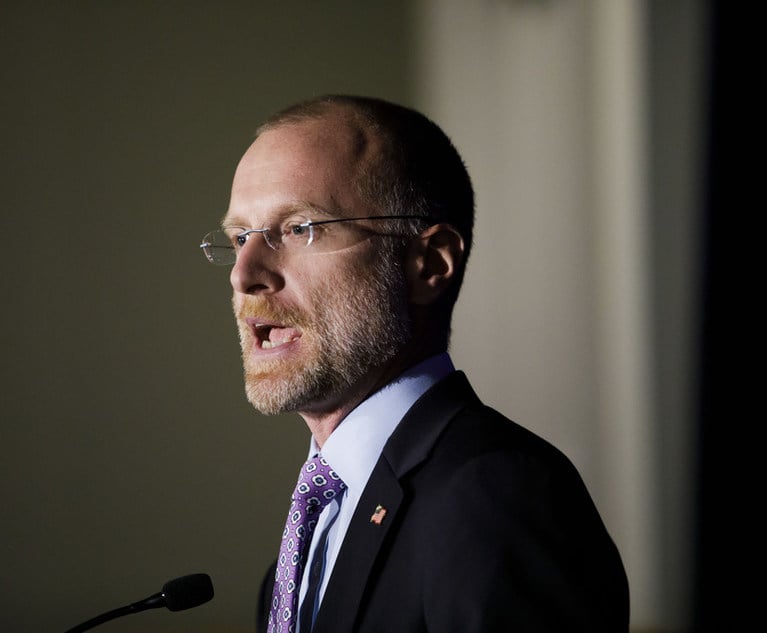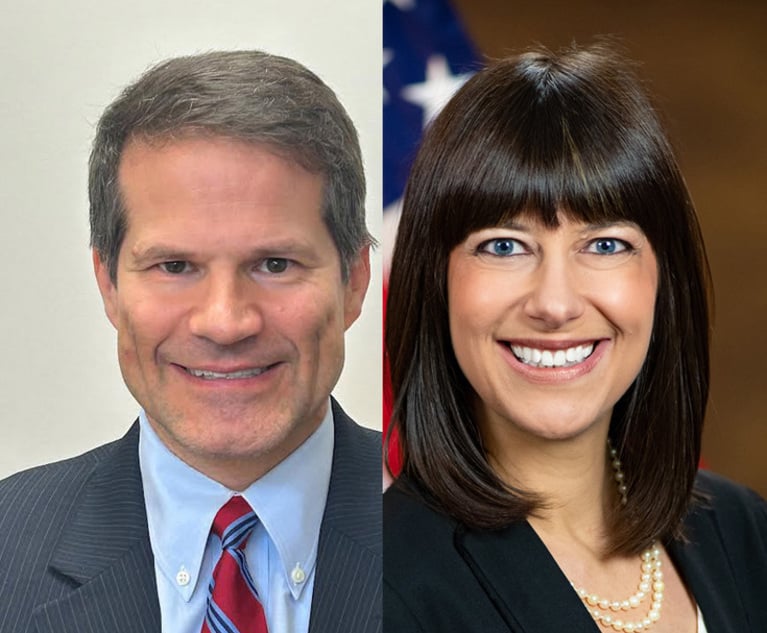 The White House
The White HouseCongress Intended That Helms-Burton Act Lawsuits Target Foreign Companies. So Far They Haven't
In permitting Title III lawsuits for the first time, the Trump administration aimed to pressure foreign investors out of Cuba. But most of the defendants thus far have been U.S. companies whose activities only touch Cuba in a minor way.
April 22, 2020 at 05:57 PM
6 minute read
One year ago, the Trump administration announced the activation for the first time of a provision in the Helms-Burton Act of 1996 that allows U.S. nationals to sue companies that "traffic" in property expropriated by the Cuban government after the start of the Cuban Revolution. Congress enacted the provision, known as Title III, to allow "American citizens to recover damages from foreign investors who are profiting from their stolen property in Cuba." But Presidents Bill Clinton, George W. Bush and Barack Obama (and initially President Donald Trump) suspended application of Title III for more than 20 years from 1996 to 2019. Prior administrations (including the George W. Bush administration, in which I served as the legal adviser for the Department of State, where I was responsible for the implementation of the Helms-Burton Act) believed that activating Title III would produce a flood of complex lawsuits in U.S. courts and cause diplomatic friction with close allies.
In permitting Title III lawsuits for the first time, starting May 2, 2019, the Trump administration aimed to pressure foreign investors out of Cuba and thereby starve the regime of resources. The administration may also have expected to score political points by allowing Americans—especially Cuban Americans in Florida—to sue foreign companies in U.S. courts. But the actual result has been different: the majority of defendants in the lawsuits filed so far have been U.S. companies whose activities touch Cuba only in some minor way, rather than the Cuban companies or foreign companies that now own, lease or operate property in Cuba. Title III's activation, in short, has been a failure and should be reversed.
Congress passed the Helms-Burton Act, also known as the "Cuban Liberty and Democratic Solidarity (Libertad) Act," to increase the economic isolation of the Cuban government and encourage the ouster of Fidel Castro. In addition to Title III, the act codifies executive branch sanctions prohibiting U.S. companies from doing most business in Cuba. Title IV directs the secretary of state to deny U.S. visas to directors, officers and controlling shareholders of companies that traffic in confiscated property.
The act defines "traffic" broadly to include not only any "commercial activity using or otherwise benefiting from confiscated property" but also "profiting" from trafficking carried out by others. Moreover, Title III imposes draconian penalties for companies found liable for trafficking. Plaintiffs who are among the nearly 6,000 American companies and individuals with claims certified by the Foreign Claims Settlement Commission (part of the Department of Justice) in the early 1960s may collect the amount of their certified claim, plus treble damages, interest over the last 60 years, and attorney fees. An estimated 200,000 additional claimants without certified claims may be eligible to file lawsuits as well. Individual Title III awards could be close to (or over) $1 billion.
Given the shiny pot of gold at the end of the Title III rainbow, it is perhaps surprising that only 26 lawsuits have been filed since the provision's activation a year ago. But the major U.S. companies that hold the largest claims may be reluctant to sue the Cuban government (because they may seek to do business in Cuba in the future) or to sue European, Canadian or Mexican companies (who are corporate partners and who may be able to take advantage of "blocking statutes" passed by their governments that prohibit them from complying with the act). Smaller claimants may be deterred by the cost and length of litigating Title III lawsuits.
When it enacted Title III, Congress expected that the defendants would be non-U.S. companies, such as Cuban companies, European hotel chains and Mexican telecommunications operators that lease or use properties expropriated from Americans in Cuba. But the reality has been far different. Of the 76 total companies named as defendants in Title III lawsuits over the last year, almost 50 have been U.S. companies, including American Airlines, Visa, Mastercard, Amazon, Travelocity and Expedia (which is a defendant in six lawsuits).
Moreover, none of the U.S. defendants are leasing or operating property in Cuba. Some (like American Airlines) provide travel to Cuba pursuant to licenses issued by the Treasury Department, while others (such as Visa, Mastercard and Expedia) simply provide travel or financial services to persons who travel to Cuba. These are far different from the non-U.S. companies actually operating in Cuba that Congress and, presumably, the Trump administration intended to penalize when they enacted and activated Title III.
U.S. courts will now have to grapple with complex legal questions such as whether processing a credit card payment for a traveler to Cuba or landing at a Cuban airport constitutes "trafficking." And given the broad definition of trafficking, may multiple defendants be found liable for trafficking (booking the room, processing the payment, operating the hotel) for the same Cuban property? These questions are likely to take a decade or more to resolve, perhaps ultimately by the Supreme Court.
The Trump administration acted precipitously when it activated Title III and has ended up causing significant legal burden and expense for many U.S. companies. Creative plaintiffs are likely to file more suits. The administration should now at least explore suspending Title III with respect to U.S. companies and companies of countries that cooperate with the United States to promote human rights in Cuba and other areas, although either action would be open to serious domestic and international legal challenges. The better course would be to re-suspend Title III entirely before the current trickle of suits becomes a flood.
John B. Bellinger III is the co-chair of Arnold & Porter's global law and public policy practice and adjunct senior fellow at the Council on Foreign Relations. He served as the legal adviser for the Department of State from 2005-2009 and senior associate counsel to the president and legal adviser for the National Security Council from 2001-2005 in the George W. Bush administration.
This content has been archived. It is available through our partners, LexisNexis® and Bloomberg Law.
To view this content, please continue to their sites.
Not a Lexis Subscriber?
Subscribe Now
Not a Bloomberg Law Subscriber?
Subscribe Now
NOT FOR REPRINT
© 2024 ALM Global, LLC, All Rights Reserved. Request academic re-use from www.copyright.com. All other uses, submit a request to [email protected]. For more information visit Asset & Logo Licensing.
You Might Like
View All
Democratic State AGs Revel in Role as Last Line of Defense Against Trump Agenda
7 minute read
Big Law Communications, Media Attorneys Brace for Changes Under Trump
4 minute read
Trump's SEC Overhaul: What It Means for Big Law Capital Markets, Crypto Work

Trump's Solicitor General Expected to 'Flip' Prelogar's Positions at Supreme Court
Law Firms Mentioned
Trending Stories
Who Got The Work
Michael G. Bongiorno, Andrew Scott Dulberg and Elizabeth E. Driscoll from Wilmer Cutler Pickering Hale and Dorr have stepped in to represent Symbotic Inc., an A.I.-enabled technology platform that focuses on increasing supply chain efficiency, and other defendants in a pending shareholder derivative lawsuit. The case, filed Oct. 2 in Massachusetts District Court by the Brown Law Firm on behalf of Stephen Austen, accuses certain officers and directors of misleading investors in regard to Symbotic's potential for margin growth by failing to disclose that the company was not equipped to timely deploy its systems or manage expenses through project delays. The case, assigned to U.S. District Judge Nathaniel M. Gorton, is 1:24-cv-12522, Austen v. Cohen et al.
Who Got The Work
Edmund Polubinski and Marie Killmond of Davis Polk & Wardwell have entered appearances for data platform software development company MongoDB and other defendants in a pending shareholder derivative lawsuit. The action, filed Oct. 7 in New York Southern District Court by the Brown Law Firm, accuses the company's directors and/or officers of falsely expressing confidence in the company’s restructuring of its sales incentive plan and downplaying the severity of decreases in its upfront commitments. The case is 1:24-cv-07594, Roy v. Ittycheria et al.
Who Got The Work
Amy O. Bruchs and Kurt F. Ellison of Michael Best & Friedrich have entered appearances for Epic Systems Corp. in a pending employment discrimination lawsuit. The suit was filed Sept. 7 in Wisconsin Western District Court by Levine Eisberner LLC and Siri & Glimstad on behalf of a project manager who claims that he was wrongfully terminated after applying for a religious exemption to the defendant's COVID-19 vaccine mandate. The case, assigned to U.S. Magistrate Judge Anita Marie Boor, is 3:24-cv-00630, Secker, Nathan v. Epic Systems Corporation.
Who Got The Work
David X. Sullivan, Thomas J. Finn and Gregory A. Hall from McCarter & English have entered appearances for Sunrun Installation Services in a pending civil rights lawsuit. The complaint was filed Sept. 4 in Connecticut District Court by attorney Robert M. Berke on behalf of former employee George Edward Steins, who was arrested and charged with employing an unregistered home improvement salesperson. The complaint alleges that had Sunrun informed the Connecticut Department of Consumer Protection that the plaintiff's employment had ended in 2017 and that he no longer held Sunrun's home improvement contractor license, he would not have been hit with charges, which were dismissed in May 2024. The case, assigned to U.S. District Judge Jeffrey A. Meyer, is 3:24-cv-01423, Steins v. Sunrun, Inc. et al.
Who Got The Work
Greenberg Traurig shareholder Joshua L. Raskin has entered an appearance for boohoo.com UK Ltd. in a pending patent infringement lawsuit. The suit, filed Sept. 3 in Texas Eastern District Court by Rozier Hardt McDonough on behalf of Alto Dynamics, asserts five patents related to an online shopping platform. The case, assigned to U.S. District Judge Rodney Gilstrap, is 2:24-cv-00719, Alto Dynamics, LLC v. boohoo.com UK Limited.
Featured Firms
Law Offices of Gary Martin Hays & Associates, P.C.
(470) 294-1674
Law Offices of Mark E. Salomone
(857) 444-6468
Smith & Hassler
(713) 739-1250









